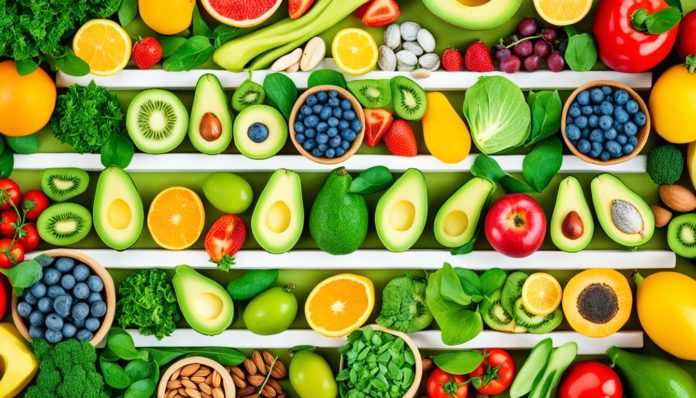Vitamin E, known as Tocopherol, is crucial for maintaining health. It’s celebrated for its strong antioxidant qualities. These help fight oxidative stress and shield the body from chronic diseases.
This nutrient boosts the immune system and makes skin healthier. It’s key for maintaining good health.
Moreover, Tocopherol’s benefits improve heart health and have anti-aging effects. It plays a critical role in keeping us healthy and energetic as we age.
Key Takeaways
- Vitamin E, or Tocopherol, is an essential nutrient for overall health.
- It acts as a powerful antioxidant to prevent oxidative stress.
- Vitamin E supports immune function and skin health.
- Regular consumption aids in cardiovascular health.
- Its anti-aging properties contribute to long-term vitality.
Introduction to Vitamin E
Vitamin E is one of eight essential vitamins that are key for our health. Check out a detailed Vitamin E definition here. It explores its chemical makeup and different forms.

What is Vitamin E?
Vitamin E includes eight fat-soluble compounds. These are four tocopherols and four tocotrienols. It acts mainly as an antioxidant. This protects cells from being damaged by oxidation. Having these important nutrients in your diet helps keep you healthy.
Importance of Vitamin E in the Body
Vitamin E is crucial for many body functions. It’s important for the immune system and helps fight illnesses. Besides, it improves enzyme activities and helps with cellular signaling. It also supports brain health. Getting enough Vitamin E is essential for all these processes.
Health Benefits of Vitamin E
Vitamin E is a powerful nutrient that boosts your health in several ways. It helps your immune system, fights against cell damage, and keeps your heart healthy. These benefits are key for staying well.
Antioxidant Properties
Vitamin E acts as an antioxidant. This means it protects your cells from damage. Free radicals, which harm cells and might cause chronic diseases, are kept in check by Vitamin E.
This helps keep your cells healthy and prevents many health problems.
Immune System Support

Vitamin E is crucial for your immune system. It helps your body fight off illnesses and infections. By boosting the production of immune cells, Vitamin E makes sure your body can defend itself effectively.
Cardiovascular Health
Vitamin E is great for your heart. It stops atherosclerosis, which is when your arteries get hard and narrow. This keeps your heart working well and lowers your risk of heart disease.
By adding Vitamin E to your diet, you’re doing a lot for your heart’s health and your overall well-being.
| Benefits of Vitamin E | Description |
|---|---|
| Antioxidant Properties | Neutralizes free radicals to protect cells from damage. |
| Immune Booster | Enhances the body’s defense mechanism against illnesses and infections. |
| Heart Health | Prevents atherosclerosis and improves overall heart function. |
Vitamin E for Skin Health
Vitamin E, a powerful antioxidant, is key for healthy skin. It brings many benefits for skin’s look and condition.
Anti-Aging Effects
Vitamin E for skin is known for fighting aging. It battles free radicals, reducing wrinkles. It’s key in anti-aging skincare.
It also protects the skin from the sun. This slows down skin aging.
Moisturizing Benefits
Vitamin E greatly improves skin hydration. It boosts the skin’s ability to stay moist. Using Vitamin E makes skin smooth and soft.
It fights off dryness and keeps moisture well. This means healthier skin.
Role in Healing Skin Conditions
Vitamin E is also crucial for healing skin issues. It lowers inflammation, aiding in eczema and psoriasis relief. It helps skin heal faster and lessens discomfort.
This makes it vital for skin health plans.
Sources of Vitamin E
Eating foods with natural Vitamin E is key for staying healthy. We’ll look at the best foods for Vitamin E. They include both plant and animal sources for a balanced diet.
Top Vitamin E Foods
To eat better, it’s good to know the top Vitamin E foods. These foods are full of Vitamin E and easy to add to your meals. Let’s explore some top picks for Vitamin E:
- Sunflower seeds
- Almonds
- Spinach
- Avocado
- Olive oil
Plant-Based Sources
Vitamin E from plants comes from nuts, seeds, and leafy greens. These options are not just healthy but also flexible for cooking.
| Food Item | Vitamin E Content (mg per serving) |
|---|---|
| Sunflower Seeds | 7.4 mg |
| Almonds | 7.3 mg |
| Spinach | 0.6 mg |
| Avocado | 2.1 mg |
| Olive Oil | 1.9 mg |
Animal-Based Sources
If you eat animal products, plenty of Vitamin E sources exist. Here are some examples:
- Trout
- Salmon
- Shrimp
- Eggs
- Chicken
Mixing plant and animal Vitamin E sources helps balance your diet. This supports your body’s functions and boosts health.
Vitamin E Supplements
Vitamin E supplements are getting more popular as an alternative to food sources. They offer an easy way to get this vital nutrient.
Vitamin E Capsules
Vitamin E capsules are a common choice. They’re simple to use, carry, and measure. This makes them a good option for those who are always busy.
When choosing Vitamin E capsules, it’s important to check the label. You’ll want to see if they have natural or synthetic Vitamin E. The natural kind is usually absorbed better by our bodies.
Choosing the Right Supplement
Choosing the best Vitamin E supplement requires looking at a few things. The quality of the supplement comes first. Look for products tested by third parties to ensure they’re good.
It’s also key to talk with a healthcare expert to get the dose right. Too much can be harmful. And, always check how it might interact with other things you’re taking.
| Factor | Consideration |
|---|---|
| Form | Natural vs. Synthetic |
| Quality | Third-Party Tested |
| Dosage | Consult Healthcare Professional |
| Interactions | Check with Medications |
Role of Vitamin E in Preventing Deficiencies
Vitamin E is key to our health. It stops a range of health problems by supporting our nerves and immune system. Knowing how to spot a lack of Vitamin E is vital for avoiding nutrition-related issues.
Neurological issues are common signs of not having enough Vitamin E. This includes poor reflexes, weak muscles, and awkward movements. In serious cases, it leads to peripheral neuropathy, damaging nerves. It can also cause vision problems.
To keep a healthy immune system, it’s crucial to prevent Vitamin E deficiencies. Not having enough can weaken our body’s defenses. This makes us more likely to get sick. Having enough Vitamin E is essential for a strong immune system.
We should eat enough Vitamin E to avoid these problems. Foods like nuts, seeds, and leafy greens are good sources. Eating these foods regularly helps keep Vitamin E levels up. This protects our health.
| Symptoms of Vitamin E Deficiency | Possible Consequences |
|---|---|
| Neurological issues | Impaired reflexes, peripheral neuropathy |
| Weakened immunity | Increased susceptibility to infections |
| Vision problems | Compromised eyesight |
In conclusion, Vitamin E’s role in avoiding nutrient shortages is key. With enough Vitamin E, we can protect our nerve health and immune system. This boosts our overall well-being.
Vitamin E Dosage Recommendations
Getting the right amount of vitamin E is key to enjoy its health benefits safely. Knowing the Recommended Daily Allowance (RDA) and recognizing overdose signs is crucial for your health.
Recommended Daily Allowance
The RDA for vitamin E changes with age, gender, and life phase. Let’s look at the specifics:
| Age Group | RDA (mg) |
|---|---|
| 0-6 months | 4 mg |
| 7-12 months | 5 mg |
| 1-3 years | 6 mg |
| 4-8 years | 7 mg |
| 9-13 years | 11 mg |
| 14+ years | 15 mg |
| Pregnant women | 15 mg |
| Lactating women | 19 mg |
Overdose Risks
Vitamin E is vital, but too much can cause problems. Symptoms of overdose include more bleeding, because of its blood thinning effects. It might also affect how medicines work.
To prevent overdose, stick to the RDA. Use a mix of food and supplements to get your vitamin E. Check official guidelines for detailed info.
Vitamin E (Tocopherol) in Everyday Life
Adding more Vitamin E to your day can greatly benefit your health. This nutrient is not just an antioxidant. It also boosts heart health. Here are easy ways to add Vitamin E to your meals and use vitamin-enriched products for the best effects.
Incorporating Vitamin E in Diet
Increasing your Vitamin E intake is simple. Start by eating more nuts and seeds, like almonds and sunflower seeds. These are packed with Vitamin E and easy to add to any meal. For fruit and veggie lovers, spinach, broccoli, and avocados are great picks. Eating a variety of these foods will cover your Vitamin E needs.
Planning your meals is key to getting enough Vitamin E. Make sure your meals include both plant and animal Vitamin E sources. Check out this helpful guide for tips on incorporating these foods into your diet.
Using Vitamin E Products
There are also many Vitamin E-rich skincare products. Creams and serums with Vitamin E fight aging and boost skin health. Using these regularly keeps your skin moist and young.
Vitamin E supplements are another great option. They’re ideal for those who can’t get enough from food. Always talk to a doctor before starting supplements to get the right amount for you.
For more on Vitamin E’s benefits, like its role in fighting neurological and eye diseases, read this detailed study.
Conclusion
Vitamin E, also known as Tocopherol, is crucial for our health. It has amazing antioxidant properties. These help support our immune system and keep our hearts healthy.
Vitamin E is also great for the skin. It helps fight aging, moisturizes, and heals wounds. It’s important to include it in your diet for these reasons.
To get enough Vitamin E, eat both plant and animal foods. If you find this hard, supplements are a good option. But remember, taking too much can be harmful. For more info on supplements, check out this nutrition guide.
Adding Vitamin E to your daily life can boost your health. It’s key to know how to use it well. Vitamin E is vital for people who want natural health and skin care solutions.
FAQ
What are the benefits of Vitamin E?
Vitamin E is a strong antioxidant. It fights oxidative stress and boosts immune function. It also helps keep our skin healthy. Besides these, it supports heart health. It prevents chronic diseases too.
What foods are high in Vitamin E?
Many foods have Vitamin E. Nuts like almonds, sunflower seeds, and green veggies such as spinach are good sources. Plant oils, fish, and dairy products also have it.
Can Vitamin E supplements be taken daily?
Yes, you can take Vitamin E supplements every day. They are good if your diet is missing this nutrient. But, it’s important to talk to a doctor first. They can tell you the best dose.
How do I know if I’m deficient in Vitamin E?
Not enough Vitamin E can cause muscle weakness and vision issues. It can also weaken your immune system. If you notice these signs, see a doctor. They can test and help you.
What is the recommended daily allowance (RDA) for Vitamin E?
The RDA for Vitamin E changes with age and gender. Adults usually need about 15 milligrams (22.4 IU) daily. Pregnant and breastfeeding women might need different amounts. Always check with a doctor for what you need.
How does Vitamin E benefit the skin?
Vitamin E is excellent for your skin. It fights aging and keeps skin moist. It can reduce wrinkles and protect against UV damage. It also helps with skin issues like eczema and psoriasis.
Are there any risks associated with taking too much Vitamin E?
Yes, too much Vitamin E can be harmful. It might increase bleeding risk. It can also affect some medicines. It’s key to stick to the recommended amount. Always get advice from a healthcare professional.
What forms of Vitamin E are available in supplements?
Supplements offer Vitamin E in different forms. These include both natural and synthetic. Natural versions are usually more effective. You can find it in liquids, capsules, and multivitamins. Make sure you know what type you’re using for the best results.
How can I incorporate more Vitamin E into my diet?
To get more Vitamin E, eat nuts, seeds, and green veggies. Cooking with plant-based oils helps too. Don’t forget about seafood and dairy.
Why is Vitamin E considered an essential nutrient?
Vitamin E protects our cells from damage and helps keep our immune system strong. It also keeps skin and heart healthy. Since our body can’t make it, we need to get it through food or supplements. It’s essential for our health.


